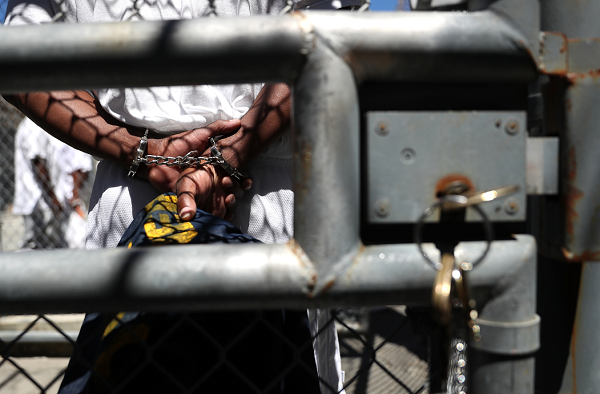White Men Vs. Black Men Prison Statistics 2016: Why Are More African American Males Incarcerated?

Black people only represent 13.3 percent of the U.S. population while white people make up about 77 percent. But there are more black men in state prisons across the nation than there are white men.
The latest Federal Bureau of Prisons statistics showed the white population was 58.7 percent in August, compared to the 37.8 percent of blacks being housed at federal institutions. At the state level, however, the department said that black male prisoners represent 38 percent of the population while whites males account for 35 percent and 21 percent are Hispanic males. Overall, blacks are 5.1 more times likely to be incarcerated than whites, and blacks represent more than half of the prison population in 11 states.
Racial disparities could be the biggest reason why black males are so overrepresented in state prisons. A 2011 Washington Post report by Marc Mauer of The Sentencing Project and Georgetown law professor David Cole highlighted the differences in the number of arrests and heavier sentences black men appear to get compared to that of white men.
For instance, in 2003, black men were reportedly 12 times more likely to receive prison sentences for drug offenses even though surveys have shown white and black people in the U.S. use and sell drugs at almost the same rate. Blacks only represent a small fraction of the U.S. population and they only account for 14 percent of drug users in the country, but they make up 34 percent of people arrested for drug offenses and 45 percent of those behind bars on drug charges. Mauer and Cole suggest this may be because dealers and users are easier to target in urban, impoverished, inner-city neighborhoods as opposed to broader, suburban landscapes.
Racial profiling by police may also play a role in the number of black men serving time. Black drivers are 31 percent more likely to be stopped by the police than a white driver, according to a 2011 Police-Public Contact Survey report by the Justice Department. Blacks were twice as likely to be searched during routine traffic stops, and five percent of blacks pulled over by police aren’t told why they were stopped.
Before stop-and-frisk tactics were deemed unconstitutional in New York City by a Supreme Court judge in 2013, 54 percent of the 191,588 New Yorkers stopped-and-frisked by police that year were black while only 11 percent of searches involved white people.
Racism and how others view blacks may also play a role in a jury's verdict and a judge's sentencing. Duane Buck, a black inmate currently appealing his death row sentence in Texas, believes racism may have played a factor in his initial trial after a psychologist testified and perpetuated that he would be more likely to kill again because he was black. During his trial, former prison psychologist Walter Quijano suggested that being black or a minority “increases the future dangerousness” of a person "for various reasons," which Buck believes inevitably led the jury to convict him to death. The inmate, who has been appealing his death sentence for the past 14 years, will get his appeal heard before the Supreme Court on Wednesday.
Although prison populations are on the decline, more than 1.5 million people were prisoners in state and federal correctional institutions in 2014, according to a report by the Bureau of Justice Statistic.
© Copyright IBTimes 2024. All rights reserved.






















